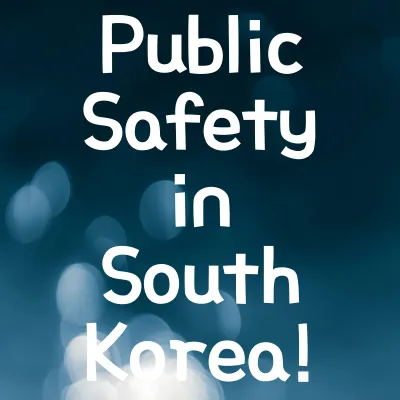One of the World’s Most Secure Countries
South Korea is consistently ranked among the safest countries in the world. With ultra-strict gun laws, a dense network of surveillance, and an efficient police response system, safety here isn’t just a reputation—it’s a lived reality.
Gun Control and Low Crime: A Rare Combination
South Korea has some of the world’s strictest firearm regulations. Gun ownership is practically nonexistent for civilians, and even police officers face intense scrutiny when using their weapons. As a result, crimes involving guns are almost unheard of, and even knife-related offenses are rare due to tight controls on dangerous objects.
This has contributed to extremely low violent crime rates. In 2023, the murder rate was just 0.5 per 100,000 people—among the lowest globally. Most violent crimes, including assault or robbery, are similarly rare.
A Society That Returns Lost Phones
Forget your wallet at a café or leave your phone in a park? In South Korea, there’s a good chance it will be right where you left it—or even turned in to the nearest police station. Thanks to a high level of civic awareness and widespread surveillance, petty theft is far less common than in many Western countries.
Safe to Walk Alone at Night
Korea’s cities are known for being safe—even late at night. Whether in a busy urban neighborhood or a quiet rural town, walking alone doesn’t carry the same risks found in many other countries. It’s far more likely that a police officer—not a criminal—will be the one to approach someone lying on the street.
Ubiquitous CCTV and Real-Time Monitoring
Surveillance plays a major role in public safety. Nearly every corner, street, and alley is equipped with CCTV cameras. Local governments operate 24/7 monitoring centers that actively track incidents and assist in rapid police response. These systems also help enforce traffic rules, prevent illegal dumping, and reduce crime through constant visibility.
Community Structure and Urban Design
Korea’s urban landscape also contributes to its safety. The majority of the population lives in apartment complexes, which are harder to target than isolated homes. With dozens or even hundreds of neighbors nearby, and with security staff often present, it’s difficult for criminals to go unnoticed. Ongoing redevelopment further reduces slum-like areas where crime might otherwise thrive.
Advanced Policing and Emergency Response
South Korea’s focus on safety isn’t new. As early as the 1980s, the government expanded emergency services by deploying ambulances and forming rescue and counterterrorism units. These efforts intensified around major events like the 1988 Seoul Olympics and 2002 World Cup.
Thanks to this legacy, today’s 112 emergency call system ensures help arrives in minutes—typically under 5 minutes in cities and under 10 minutes in rural areas.
Misperceptions from Abroad
Despite its strong safety record, South Korea is sometimes mistakenly viewed as dangerous due to its proximity to North Korea. However, this is largely a misconception. In fact, North Korea’s presence has pushed South Korea to strengthen its defense and security systems, resulting in even safer conditions for everyday life.
The Rise of Drug Concerns
While general crime is low, drug-related issues have emerged as a new challenge. Since the late 2010s, reports have surfaced about increased drug access across all social levels. In response, the government has declared an official war on drugs, with enforcement intensifying across the country.
Regional Gaps in Safety
While most areas are very safe, some regions such as Ansan, Daerim, or remote island communities like Sinan County have faced criticism for weaker law enforcement or local corruption. In recent years, concerns have also been raised about crime in Jeju Island due to its rising tourist population and visa-free policies.
Media Influence and Public Perception
Despite strong statistics, many Koreans feel uneasy about public safety. This is largely influenced by sensational news reports and online forums that amplify isolated incidents. As a result, even rare crimes can seem more frequent or threatening than they really are.
But it’s important to put things in perspective. Perfect safety doesn’t exist anywhere. Still, South Korea’s proactive approach, combined with civic-minded citizens and a tightly monitored environment, makes it one of the safest nations in the world today.

